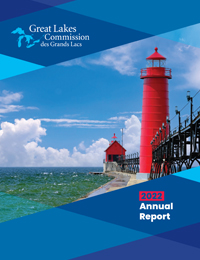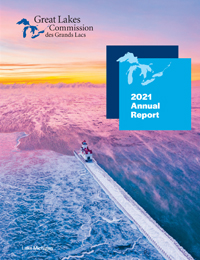Description
The Great Lakes Commission (GLC) has an immediate opening for a program specialist to work on a variety of projects related to Great Lakes water quality and infrastructure. The desired candidate should be a self-starting, highly motivated individual with a desire to protect and enhance water resources in the binational Great Lakes basin. This position may also support other GLC program areas, as needed, including emerging work focused on climate resiliency.
Responsibilities
The program specialist will be responsible for a variety of activities in support of the GLC’s water quality and water infrastructure programming, including Blue Accounting, the GLC’s initiative to report on progress toward shared goals for the basin. The program specialist will support the water quality and infrastructure team by organizing meetings, researching state, provincial, and federal policies related to water quality and water infrastructure, and compiling and aggregating data from various public sources.
Specific responsibilities include:
-
Assisting the program manager with coordinating four expert working groups focused on aspects of drinking water (source water protection; water treatment; water distribution; and water access).
-
Obtaining, curating, and organizing (often large and complex) datasets.
-
Maintaining content on project websites.
-
Assisting with the development and implementation of stakeholder outreach plans and advocacy materials related to the creation of a water infrastructure “blueprint” for the Great Lakes.
-
Processing data and compiling a detailed report on annual water use for the Great Lakes states and provinces.
-
Researching and writing reports and briefing papers upon request.
-
Assisting in planning and execution of online and in-person meetings.
-
Documenting work activities to assist with project reporting and budget tracking, including the preparation of meeting notes and summaries.
-
Tracking developments in water science and policy.
-
Supporting the aggregation of content for the GLC’s Great Lakes Daily News service.
-
Communicating effectively with project managers, partners and collaborators to complete the assigned tasks.
-
Assisting in project communication as directed by supervisors, including preparing factsheets and newsletters, and developing web and social media content, among others.
Qualifications
A bachelor’s degree with at least two years of relevant full-time experience is required. A master’s degree with some experience is preferred. Other desired qualifications include:
-
General knowledge of water infrastructure systems (drinking water, stormwater, and/or wastewater) and related policies and programs
-
Knowledge of freshwater science and/or watershed management
-
Ability to perform qualitative and quantitative analysis
-
General knowledge of federal water policy
-
Excellent writing skills with the ability to translate complex data into easily understood information
-
Excellent organizational and time management skills with the ability to effectively manage multiple projects and deadlines
-
Proficiency with Microsoft Office suite of products (Teams, Word, Excel, PowerPoint and Outlook)
-
Ability to work independently and as part of internal and external teams
-
Ability to communicate effectively verbally and in writing
-
Experience posting web content through WordPress
-
Experience working with governmental agencies at the federal, state and provincial levels
Appointment
Position Classification
The position is classified as regular; full-time as defined by the GLC’s personnel policies.
Compensation and Benefits
The salary range for this position is $52,000 – $54,000 per year depending on education, skills and experience. The GLC offers a competitive salary and comprehensive benefits, including generous leave time, flexible schedules, medical, dental and vision insurance, and a retirement match program.
Work Environment
The GLC is located in Ann Arbor, Michigan. It is expected that the majority of work is performed in the GLC’s office. COVID-19 precautions are in place, that currently include opportunities for a “hybrid” schedule of remote and in-office work. This position requires occasional travel.
Application Process
Applicants must submit their resume and a cover letter stating their interest in and qualifications for the position as a single PDF document via email to vacancy@glc.org. All required items must be provided for an application to receive consideration. No phone calls, please.
About the Great Lakes Commission
The Great Lakes Commission (GLC) is a binational government agency established by the eight Great Lakes states to protect the Great Lakes and the economies and ecosystems they support. The Canadian provinces of Ontario and Québec serve as associate members of the GLC. Its membership includes leaders from the eight U.S. states and two Canadian provinces in the Great Lakes basin. The GLC recommends policies and practices to balance the use, development, and conservation of the water resources of the Great Lakes and brings the region together to work on issues that no single community, state, province, or nation can tackle alone. Learn more at www.glc.org.
Equal Opportunity Employer
The Great Lakes Commission strives to create an inclusive, diverse and non-discriminatory workplace. The Great Lakes Commission is an equal opportunity employer; the Great Lakes Commission complies with applicable federal, state and local laws prohibiting discrimination. It is Great Lakes Commission policy that no person shall be discriminated against, as an employee or applicant for employment, because of race, color, religion, age, sex, national origin, disability status, genetics, protected veteran status, marital status, political affiliation, sexual orientation, gender identity or expression, or any other characteristic protected by federal, state or local laws.



 The 2021 Great Lakes Commission Annual Report includes remarks from Chair Todd L. Ambs and Executive Director Erika Jensen. The Commission’s annual reports traditionally include remarks from our chair and executive director as well as information regarding revenues, expenses, and commissioners.
The 2021 Great Lakes Commission Annual Report includes remarks from Chair Todd L. Ambs and Executive Director Erika Jensen. The Commission’s annual reports traditionally include remarks from our chair and executive director as well as information regarding revenues, expenses, and commissioners.